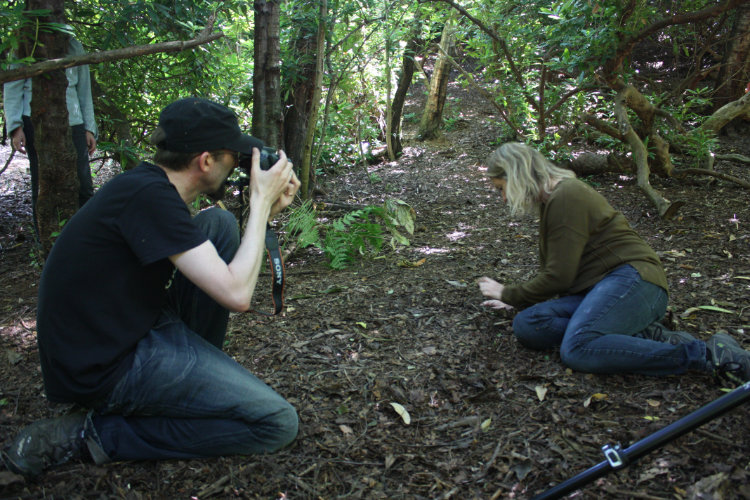shooting the film

The main shoot took place over eleven days in September / October 2017 as scheduled plus a couple of half-days for pick-ups
with Sally. The longest continuous period of shooting was four days as we had scheduled several non-shoot days to give cast
time off and to re-organise the shoot where required.
To keep the budget down we used an extremely minimal documentary-style crew where the director acted as sole camera operator
and sound recordist, with sound and grip assistance from Anna Durbridge, Valerie Adam Freeman and anyone else who was on hand.
Val had a particularly heavy task as she was not only the co-producer and creative consultant (her critical eye proved invaluable)
but also cook, driver, costume assistant and runner.
A particular highlight was our day at All Saints Church filming the graveyard, morning service and evening service scenes. We
had been very open with the community there about the fact we had an LGBTQ+ Christian character in these scenes and so we were
very pleased and proud that so many of the actual Anglican church congregation chose to be in the film.
Rather than be tightly bound to the script, we adjusted the shoot where we had to or wanted to, dropping several scenes and
changing several others. As an example, the car accident at the start of the film was originally longer and much more complex
but it became clear early on that we could simplify this to just two shots as the aftermath of the accident is far more important
than the event itself. This simplified our only night shoot, gave us an appropriately blunt scene and allowed us to stay on schedule.
Other scenes changed as we collectively worked on them. Claire's first meeting with Katherine at the back of All Saints become much
longer and affecting due to Sally and Emmas' improvisation on the day.
We are extremely grateful to all our actors and crew, especially Sally who had to take on such an emotionally draining role and had
to be present in practically every scene, often as the sole actor. Sally, Emma and David's long professional experience of screen
acting proved to be an enormous help during the shoot.
Filming completed with several brief landscape shoots in winter 2017 and the following spring and summer by which point the film
had involved over a hundred people from the local East Sussex, Surrey and Kent communities.
CINEMATOGRAPHY
Following earlier experiments with switching lenses on set, TSAL took the documentary approach of sticking with a single zoom
lens throughout production in order to maximise time with the actors.
There is some handheld work at the start and end of the film to help the dramatic flow but the film was always designed to be
mostly shot on a tripod and was often locked-off in order to portray the stillness of grief and meditation of the story. Lighting
was used but only where it was strictly necessary, only in internal scenes and only where the lighting could be shared between
angles. Long single takes were used wherever possible, again to get the stillness.
We shot in HD and planned for the 4% blow-up to 2K. 4K was avoided partly for budget but mainly for file size and processing
time knowing that 2K resolution roughly equates to celluloid 35mm and that the perceptual difference between 2K and 4K resolution
is relatively negligible. And we thought of Derek Jarman working with the much rougher resolution of Super 8 on the visually
brilliant "The Last of England" (1987) and relaxed.
SOUND RECORDING
Sound recording was kept very simple with several audio recorders left running all the way through shooting each scene without
stopping between camera takes. This meant much more time in post to extract and re-sync the audio but, again, it meant our time
for each set-up was kept as short as possible.
Many scenes could be shot without sound as we had already planned where score and sound design were likely to dominate the audio.
Conversely there were also a number of audio-only recording sessions on location to capture traffic ambiences and foley such
as the creaking wooden pews and footsteps in the church. There was also several sessions to record nature ambiences in East
Sussex and South East Scotland which were taken over the course of a year.
Sunday 17 January 2021